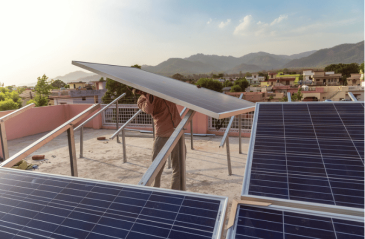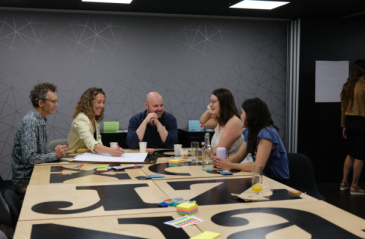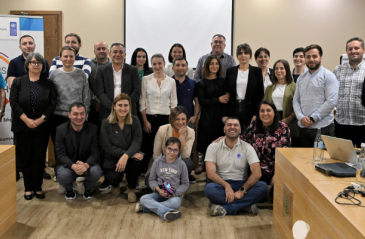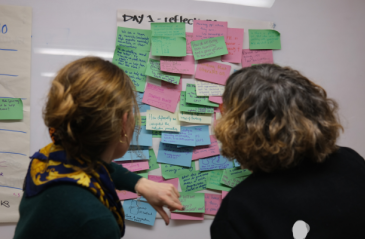
The power of storytelling in climate leadership

Oxfam is at any given time is responding to over 30 emergency situations
Share articleWinnie Byanyima: 'The gains of growth go mostly to a small elite group of individuals'
Share articleWinnie Byanyima: 'We need governments to rein in all this money that is not being taxed'
Share articleWe put our vision for government into practice through learning partner projects that align with our values and help reimagine government so that it works for everyone.
Did you know that one in three people in the world lives in poverty? Winnie Byanyima is only too aware of it, and it's unwelcome facts like this that are powering her mission as executive director of Oxfam International. There is much to do.
"It's the policies of the last 30 years that got us here," she says. "The wage gap between ordinary workers and those at the top has never been so wide as it is today. The 62 richest people now own as much wealth as the 3.6 billion who make up the poorest half of the world's population. They need to understand that these levels of economic inequality are bad for them. They undermine long-term growth."
Oxfam - which at any given time is responding to over 30 emergency situations - is an international confederation of 18 organisations working together with partners and local communities in more than 90 countries. For Byanyima - who took up her role in April 2013 - it offers a chance to continue her lifelong work in the fields of women's rights, democratic governance and peace-building. Indeed, having chalked up stints in the Ugandan Parliament, the African Union Commission and as director of gender and development at the United Nations Development Programme - among others - it's easy to see why Oxfam International's headhunters were drawn to her cv.
Now, though, she is applying her campaigning zeal to Oxfam's long-standing work on issues such as inequality. "In the last 30 years we have seen rich people and rich companies come together to really hijack political power and use it to favour themselves," she says. "The gains of growth go mostly to a small elite group of individuals, while the rest get so little from their hard work from the growth they contribute to. The extremely rich can lower their own taxes and force austerity on the poor. They get bailouts when they crash the economy and poor people have to absorb the pain. People understand that this is not fair and they don't trust governments that are seen to be in collusion with the very rich and are fuelling further inequality."
To illustrate her point, she goes on to cite Oxfam's report from April this year entitled Broken at the top. "We looked at 50 top US companies including big brands like Wal-Mart, Goldman Sachs and so on," she says. "The report showed that for every dollar spent on lobbying by these 50 companies, they got back $130 in tax breaks and more than $4,000 in federal loans, loan guarantees and bailouts. What a scandalous rate of return."
Byanyima traces much of the global inequality to taxation - specifically, the ability of companies and rich individuals to circumvent rules and laws which the less well-off are far more likely to abide by. Right now, she believes, we are some way off from ensuring that all of us pay our fair share and, as a result, policymakers should be front and centre in the drive to correct this imbalance.
"Companies have created a situation where they are allowed by law to stash away their money in tax havens so that it is not taxed," she says. "We need governments to get a process to rein in all this money that is not being taxed, so it comes and buys the public goods that we need. I would like to see progress on global corporate tax reform that could stop the harmful tax competition where companies just push governments further and further down to reduce their tax rates and take natural resources - most of the time without paying their fair share of taxes. This is critical."
However, it's not just governments that have a role to play. Multilateral organisations, too, can adjust their practices in order to have a more positive impact, she believes. Take the World Bank's International Finance Corporation (IFC), for example.
"Oxfam research has shown that 80% of IFC lending in sub-Saharan Africa is to companies that channel their money through tax havens," says Byanyima. "Surely the World Bank should not be complicit in this kind of behaviour - it should not work with companies that are avoiding paying their fair share of tax. The Bank joined a coalition with the IMF, the UN Committee on Tax and the OECD to start a new platform for negotiating global corporate tax reform. We want to see this move faster. We want a global tax reform that will help poor countries get all the money they should raise through domestic resource mobilisation to pay for services and restore the people's trust."
Byanyima - perhaps due to her legislative roots - does not shy away from commenting on matters political. For her, it is an intrinsic part of Oxfam's campaigning role and it is clear she places great importance on giving voice to impoverished and hungry people around the world.
"It is no surprise that inequality has forced governments to make a choice - either reduce the gap between rich and poor or silence people when they decide to speak out against such gross injustice," she says. “Unfortunately, around the world we are seeing governments choose the option of silencing people. For example, Civicus, which is a global alliance working on citizen rights, has shown in its research that civic freedoms are being threatened in more than 100 countries. And in a report this year, the International Trade Union Confederation surveyed 141 countries and found that freedom of association and freedom of speech had been reduced by 22%, so we see an increasing silencing of the majority because they don't trust their government."
To counter these trends, Byanyima recommends greater "meaningful engagement" with citizens. "Oxfam works with citizens around the world, supporting them to organise themselves and speak and be heard and to claim their rights," she says. "For example, in Ghana we worked with a coalition of citizens on the IMF bailout. The IMF was negotiating a bailout with the government. Through this action the people - who called themselves the civil society platform - were able to insist that the bailout didn't cut social spending but actually increased social spending by about 30%. Having achieved that, this coalition is now working on ensuring that this money is being spent well. It started with them organising to influence the bailout and now they are empowered."
Such stories offer hope and confidence about what is possible when communities come together. And it's why Byanyima remains an optimist - despite the array of challenges which crowd Oxfam's horizon. "Poor people are just as clever as rich people," she concludes. "They can see a system where public policy is rigged against them and service delivery is cheating them. But when people organise to challenge seriously, you also see far more positive results."











